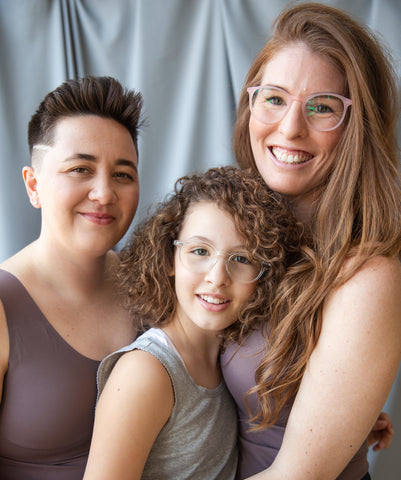We recently met Bianca Sprague, Alana Nugent, and their ten-year-old daughter Gray during our “Tank You Mom” photo shoot. Long story short, they’re awesome. Together, Bianca and Alana parent Gray, who was born from Bianca’s previous relationship, and they’re now planning to grow their family. Bianca is recovering from a hysterectomy, so Alana is gearing up to carry their next child. They also run a business together (bebomia.com) and, in their “spare” time, are advocates for those who are gender non-conforming (GNC).
They spoke openly with us about their family life, their health scares, and about the work they are doing to challenge society’s norms.
 Knix: Alana, tell me about the first time you met Gray.
Knix: Alana, tell me about the first time you met Gray.
Alana: Going into the relationship, I was very mindful of how that was going to impact Gray. I was introduced as a friend at [first] and shortly after that, when it was appropriate, Bianca shared that she had been seeing someone new and it was her friend (me) that she had met. From there it started to naturally evolve, but it took some time. Gray is a very intuitive individual who up to that point had had a lot of loss and heartbreak and was hesitant to let me in. She didn’t feel entirely ready to open up and introduce a new person into her life.
Knix: What was it like stepping into the role of mother? What is your relationship like with Gray?
Alana: She calls me “Mah.” For a lot of the time, I was doing the labour and the work of a mom, but I felt invisible because I wasn’t the biological mother. With my immediate family, I’m still struggling to get my parents on board to understand that this is my child and this is my family.
Knix: Now you are planning to have a child together. Are you excited about the idea of carrying a baby?
Alana: In the last few years, I have felt like it’s a piece I’ve been missing out on. I feel like this is something I connect with because I challenge gender norms and what it means to be a woman [in that I present as androgynous]. Like any normal person, I’m scared sh*tless about it, but I also have one of the best doulas in the city (Bianca!) to support me in any kind of birth experience I want, which is super supportive in quelling any fears.
Knix: How do you think the dynamic will change in your home when you bring another child into the family?
Bianca: Gray is counting down the minutes! She is adamant that she wants brothers and sisters. I’m scared sometimes about not being the birth mother. We have our fears but we talk about them and just cross our fingers and hope that it will work out okay.
Alana: If anything, it might strengthen all of our relationships. And deepen my empathy. Sometimes I feel bummed that I missed out on that newborn part with Gray and I want to experience it for myself. As much as I do all the work and labour of an engaged mom, there are times when I feel like an imposter or not a “real” mom, even though I am a real mom. It’s interesting how heavily we still value biology.
Knix: Bianca, do you want to talk about your hysterectomy? How do you feel about having a second child that you won’t be carrying?
Bianca: It’s been a huge loss for me. I am in my first six months post-op and I still feel so connected to it, even though it was a diseased uterus. It’s been challenging and I made Alana promise she was going to have babies for us. I am still getting used to the emotional healing, knowing that I could never have another baby and losing that part of my femininity— which is something that I’m championing now. The interpretation of what women and couples look like is always changing and there is always room to learn more and do better.
[Gray enters the room].
Knix: Gray, what’s it like having two moms?
Gray: It’s really fun. It’s kind of awkward in social situations because it feels weird, saying I have two moms. I don’t feel like I’m accepted as well when people know I have two moms.
What’s Gray’s advice for any kids going through the same thing?
For all those kids out there who have families outside the heteronormative model, if you find yourself left out in social situations and your friends are being mean to you, then find some new friends. If people are teasing you about your family, it has nothing to do with you. It means that your friends need support around learning about this topic - and it’s not your job to educate them. You and your family are perfect the way you are.
To learn more about Bianca and Alana’s work, visit bebomia.com or check out Bianca’s blog.
And to learn more about using inclusive and gender diverse language, check out the following resources:
https://www.bebomia.com/actually-inclusive-put-biz-test/
https://www.bebomia.com/diverse-families-certification/
https://www.rainbowhealthontario.ca/resources/media-reference-guide-discussing-trans-and-gender-diverse-people-2/
We want to meet your family. Share your stories with us at stories@knixwear.com.